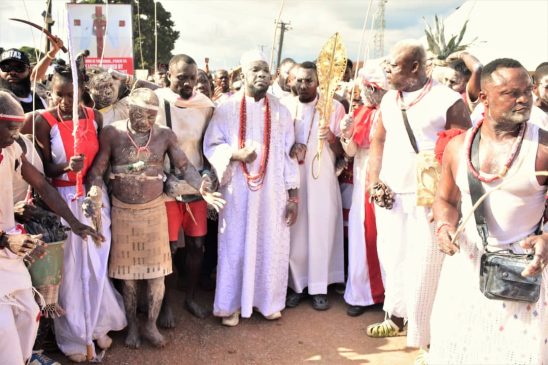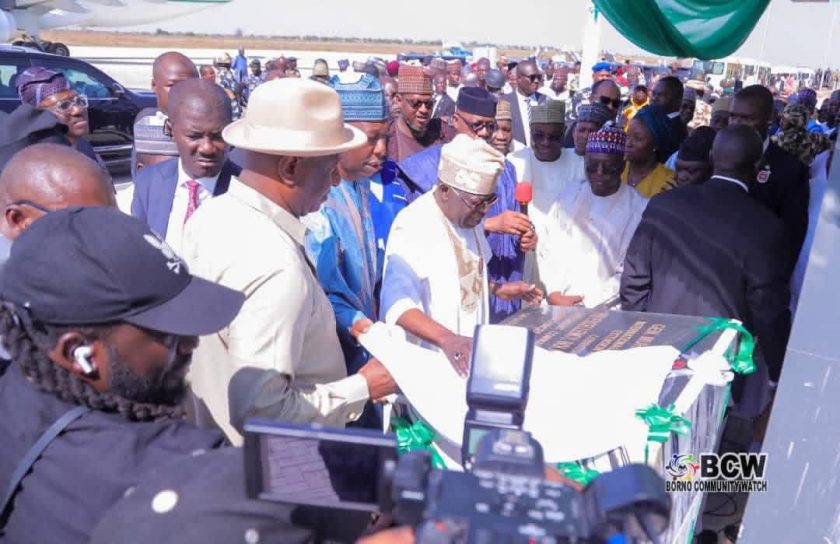By Lucy Ezeliora
The Ubulu-Uku Iwu festival 2025, a grand celebration of rich cultural heritage, kicked off wich Chief James Asika Ibori Onwordi, the Onishe Ezemu of Ubulu-Uku Kingdom leading festivities.
The first two days were marked with vibrant displays of traditions, culture and unity, with the Onishe coming out in Grand style along side other traditional chiefs to perform his duties as the traditional prime minister of the kingdom.
The festival showcases culture at its peak, as indigens soak themselves on mud and white chalk dancing with the Onishe Ezemu all around the community.
With drummers and praise singers chantering with war songs and excitements to celebrate Iwu festival.
Speaking with the Onishe Ezemu, Chief James Asika Ibori Onwordi, he disclosed that the festival is one of the numerous annual festivals celebrated within the anioma region, Iwu festival is Ubulu-Uku Christmas celebration.
According to him, Iwu festival is a festival of peace, unity and harmony among the people of Ubulu-uku in Aniocha South of Delta State. It is usually celebrated annually every October with so much merriments and fun.
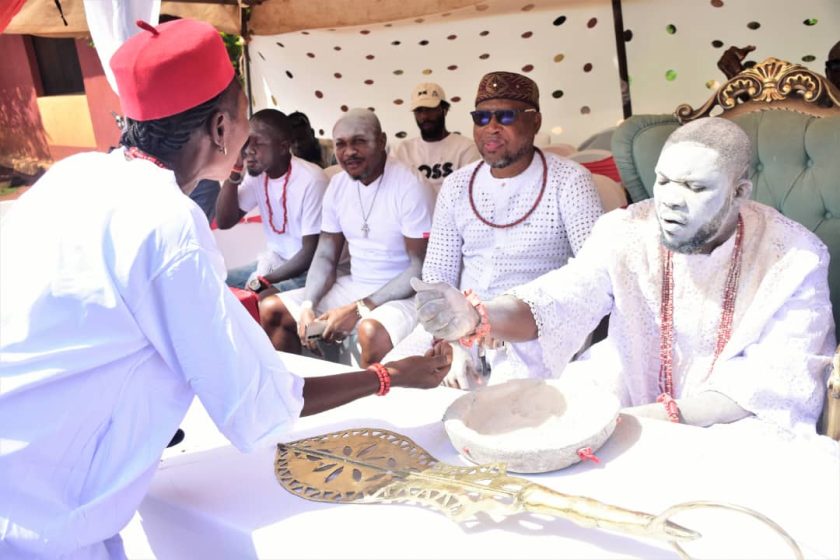
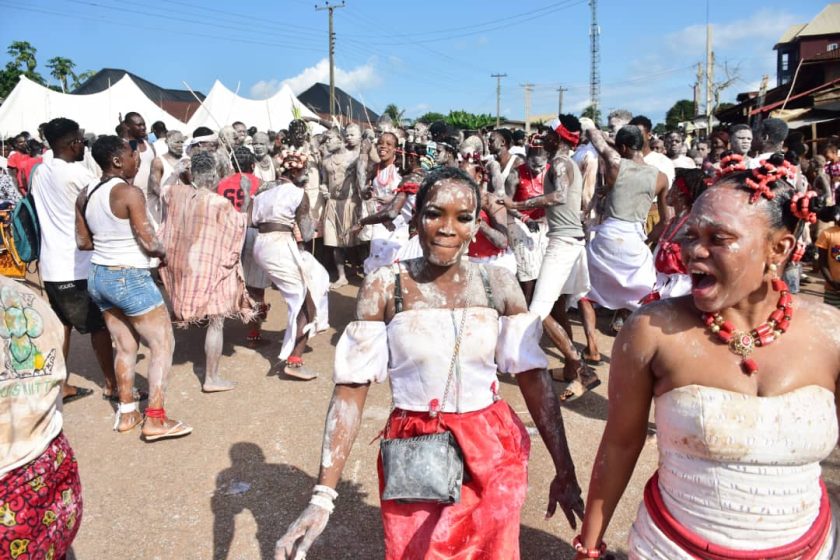
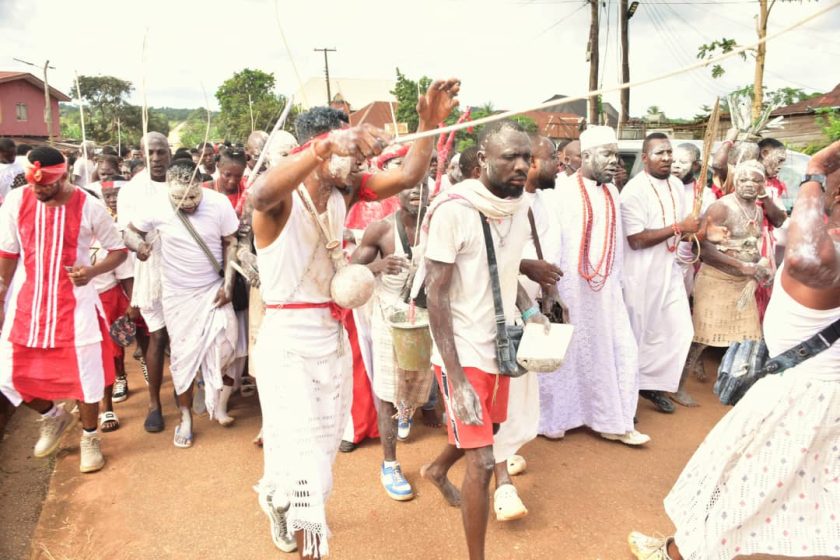
No wonder this year’s celebration was indeed great as the Onishe Ezemu Chief James Asika Ibori Onwordi fully participated in the ceremony joining his quarter to pay homage and dance to the Ezeiwu Shrine.
According to him various clans which includes Udo quarters, Agbonta, Onitcha, Ogbe- Ego Abu-edo, Aku and Isho quarters respectfully usually dance with their followers screaming “iwu! Iwu! Iwu! to the ezenmor shrine
He said, iwu celebration is a period of reconciliation forgiveness and peace and that is why the people of Ubulu-uku Kingdom can’t wait to celebrate the festival every October.
Like other festivals, Iwu is a communal festival with carefully planned programme and high revelry. It lasts for some days and its celebration mostly involves adult and youths who engage in deep rooted cultural display.
It is generally believed that as typical of other festivals, Iwu may have evolved based on communal efforts to placate forces and allow fruitful existence of man. It is also a festival associated with planting and harvest times.
According to the Onishe, iwu comes with unique songs and dance-steps which are rarely sung on normal days and every quarter in Ubulu -Uku comes in group with their leaders singing and dancing to tunes composed by them. Major musical instruments are “Agogo” (small gong), Ekwe and Akpele (native flute). Not only does Iwu go with these traditional musical instruments, it also has a tune inimitable to it.
Principal characters of the festival are Ohene (Chief Priest), three Eze-Iwu and Enem. Ohene appears in small, plain white fabric called Akwa-Ocha covering his waist with a white feather strapped to his head while the Eze-Iwus and Enem appear in red attire. Ohene’s body is robbed with white native chalk called “Nzu” in local parlance.
These characters need to be beautiful dancers and entertain the crowd. Iwu Festival of Ubulu-Uku presents the opportunity to pay great indigenes, visits and applaud them for the wonderful deeds rendered to the town; this is done with the symphony of songs.
It is also the period to compose traditional songs to ridicule the defaulters of the norms and traditions of the society no matter their position in the society. In ancient times, Iwu was a social means of exposing evils committed by natives and other inhabitants of the town believed to be clandestine. Such evils were publicly chanted round the town as celebrants move in groups.
The people especially celebrants of Iwu in Ubulu-Uku observe certain traditional rules within which the festival must be celebrated. Indigens are for instance, not allowed to wear foot-wears while celebrating the festival.
To the people of Ubulu- Uku, Iwu ground is a sacred place that must remain sanctified throughout the celebration of the festival. It is therefore considered an act of sacrilege to cover one’s feet while celebrating the festival at any given time.
Native chalks are also held sacred in the land and must be rubbed on every part of the body particularly at the time of celebrating the festival. Traditional wrestling also importantly features in Ubulu-Uku celebration of Iwu. Challenges are openly thrown to enemies for a friendly wrestling match to test their strength. It takes only cowards to rebuff such attempts when such challenges are thrown in the eyes of the public usually with a handful of sand thrown at the enemy just as it requires the Lion’s heart to openly accept such challenges before watching eyes. Significantly, a lot is expected from contestants.
These traditional wrestling bouts take place at the eve of Iwu Festival. In ancient times, quite a number of men acquired their wives through throwing their opponents to the ground. The friendly traditional wrestling contest thus served as a means of getting married. Iwu for Ubulu-Uku may also follow with a great feast in which sumptuous meals are prepared for household members and visitors.
The festival also require special kind of delicacies as foods and drinks are displayed openly for everyone to consume till the dawn of the event.
He said, the purpose of Iwu festival wherever celebrated is for purification of the land. It also serves as an appeasement and extension of gratitude to the gods for abundant harvest reaped at the season. It is believed that once the festival has held, evils committed in the town have been cleansed with a new beginning put in place. It is the cleansing of the land that makes it possible for the land to experience prosperity which is the chief motive of celebrating the festival.
Iwu of Ubulu-Uku resembles that of Ibusa in some ways yet differs in other ways. The characters are the same except that the Obi of Ubulu-Uku also has some royal roles to play before and after the festival. There exists Oshene (Ohene) who is also the Chief Priest. There are three Eze-Iwus, one for the Obi, the other for Nne-Ubulu and the last one for Ezemu. Oshene has one Eze-Iwu, Ezemu has one and the Obi of the town also has one. Isibe-Iwu (Cooking of Iwu) starts on a Sunday, brought down
When brought down, a period also known as “Ihorda Iwu” celebration continues ending on a Saturday.
A major rite of the Ihorda Iwu is the Otito which the Obi gives to the Eze-Iwus after the Iwu has been put down. Nne-Ubulu and Ezemu also gives Otito to the Eze-Iwus. With these Otitos handed to them, the Eze-Iwus embark on a journey to Mkpitime River to bring back the pots of water together with the Otito given to them. The three Eze-Iwus are expected to return to the palace with pot of water, a task that must be executed. This is the most important rite of Iwu as celebrated in Ubulu-Uku because failure to bring the pot of water means that Eze-Iwu will definitely die thus rendering the celebration of Iwu incomplete.
As noted earlier, the climax of the festival is the journey to the sacred Mkpitime River by the dancers and chief priest of the festival to bring back a pot of water each to the Obi of the community. This pot of water is carried to the palace of the Obi of Ubulu-Uku and traditionally presented to him on a Saturday signifying the end of the festival in the town.
The last day of Iwu Festival is known as “Idune-Iwu”. It is a day that the festival is rounded-off. Crowds gather and dance and dance down to the secred point. While the Onishe move into the guy along side the Chief priest to perform the main ritual of the celebration. These spectators circle the characters to enable them to entertain them with dance. A few hours later, at dusk, the characters gather and hold the crowd to a certain point.
This allows only the main actors to journey to the main ground where ceremonial acts are performed for the community’s growth and prosperity. The crowd remains held until the group return from the ground. This signifies the end of the festival.
The purpose of Iwu festival wherever celebrated is for purification of the land. It also serves as an appeasement and extension of gratitude to the gods for an abundant harvest reaped at the season.
It is believed that once the festival has held, evils committed in the town have been cleansed with a new beginning put in place. It is the cleansing of the land that makes it possible for the land to experience prosperity which is the chief motive of celebrating the festival.
There is no doubt that Iwu Festival is one of the finest festivals celebrated by the Anioma people.

